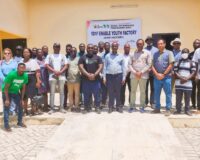In the heart of Obuasi-Akapoliso, Ghana, an inspiring story of resilience, innovation, and transformation is unfolding. Isaac Mensah, a 51-year-old entrepreneur, has built a thriving fish farming enterprise, Ike Farms, proving that with the right support and determination, success is possible. Once a carpenter, Isaac has navigated the currents of agricultural entrepreneurship to emerge as a leading figure in the fish farming industry, impacting not only his life but also his community.
A Leap into the Unknown: Isaac’s Journey into Fish Farming
Isaac Mensah’s transition from carpentry to aquaculture was fueled by curiosity and a desire for a better future. One day, while listening to the radio, he heard discussions about the potential of fish farming as a viable business. Intrigued, he decided to explore the industry, despite having no prior experience. With sheer determination, he embarked on this new venture, starting small but dreaming big.
Support from REP and AngloGold Ashanti became the foundation upon which Ike Farms was built. Through REP, Isaac gained invaluable training in business development, financial management, record-keeping, and marketing—skills that would prove crucial to his success. Reflecting on the impact of this training, Isaac noted:
“Registering my venture made it easier for me to transact business with the bank. Through that, I have benefited from the matching grant offered by REP.”
Scaling Up: From Small Beginnings to a Flourishing Business
Armed with knowledge and practical skills, Isaac formalized his business and expanded his operations. Today, Ike Farms boasts five ponds and a hatchery, supplying fish and fingerlings to farmers within and beyond Obuasi. Beyond selling fresh fish, he has diversified his business by smoking fish for sale in local markets—a strategy he attributes to insights gained from REP training sessions.
Isaac’s ability to integrate value addition into his business has significantly increased profitability and market reach. His smoked fish products attract a loyal customer base, and his hatchery has positioned him as a vital supplier within the fish farming ecosystem.
Creating Jobs and Mentoring the Next Generation
Beyond personal success, Isaac’s story is also about community impact. Recognizing the potential of aquaculture to provide livelihoods, he has become a mentor to aspiring fish farmers. Through hands-on training, he equips young people in his community with the necessary skills to start and sustain their own businesses in the sector.
By providing employment and mentorship, Ike Farms is fostering economic empowerment in Obuasi-Akapoliso. The farm currently employs several workers, and its expansion has created indirect opportunities for fish traders, hatchery workers, and market vendors.
Challenges in the Industry: Access to Finance
Despite his remarkable achievements, Isaac continues to face challenges, particularly in securing financial support for business expansion. Accessing credit remains difficult due to high-interest rates, limiting his ability to scale up operations further. He expresses concern about this hurdle, stating:
“The knowledge is available now; the help that we will need more significantly now is finance… If the bank loan is the alternative, maybe the percentage should come down moderately a bit.”
Financial constraints hinder many small-scale agribusinesses, and Isaac’s story underscores the need for more accessible and affordable financing options for farmers. With better financial backing, he envisions increasing his production capacity and launching a fish feed processing unit, which would reduce costs and create additional employment opportunities.
The Future of Ike Farms: Expansion and Sustainability
Isaac remains optimistic about the future. His long-term goal is to transform Ike Farms into a fully integrated aquaculture business, encompassing fish farming, feed production, and large-scale processing. By reducing dependency on expensive imported fish feed, he aims to lower operational costs while contributing to food security and economic growth.
Additionally, he is exploring ways to adopt more sustainable practices, such as using organic fish feed and implementing eco-friendly water management systems. These efforts align with the broader goals of the Rural Enterprises Programme and IFAD in promoting sustainable agricultural practices that benefit both farmers and the environment.
Lessons from Isaac’s Journey: The Power of Support and Innovation
Isaac Mensah’s journey from a carpenter to a successful fish farmer is a testament to the impact of structured training, mentorship, and financial support. His story highlights the crucial role of programs like REP in equipping rural entrepreneurs with the skills and knowledge needed to thrive.
His success also demonstrates the importance of innovation in agribusiness. By diversifying his product offerings and investing in a hatchery, he has created multiple revenue streams, reducing risks and ensuring sustainability.
Conclusion: A Call for More Support
Isaac’s story is one of perseverance, adaptability, and community development. His journey proves that with the right support, small-scale farmers can build thriving businesses that create jobs, boost local economies, and contribute to food security.
However, to fully realize his vision, access to affordable financing remains a pressing need. Stakeholders, including financial institutions and development partners, must explore ways to provide more accessible credit facilities to rural entrepreneurs like Isaac.
As Ike Farms continues to grow, it serves as a beacon of hope and an inspiration to many aspiring agripreneurs. Isaac’s unwavering commitment to excellence and community impact reflects the true essence of IFAD’s mission—to invest in rural people and empower them to build prosperous, sustainable futures.
Enterprise: Ike Farms
C.E.O: Isaac Mensah
Location: Obuasi-Akapoliso





